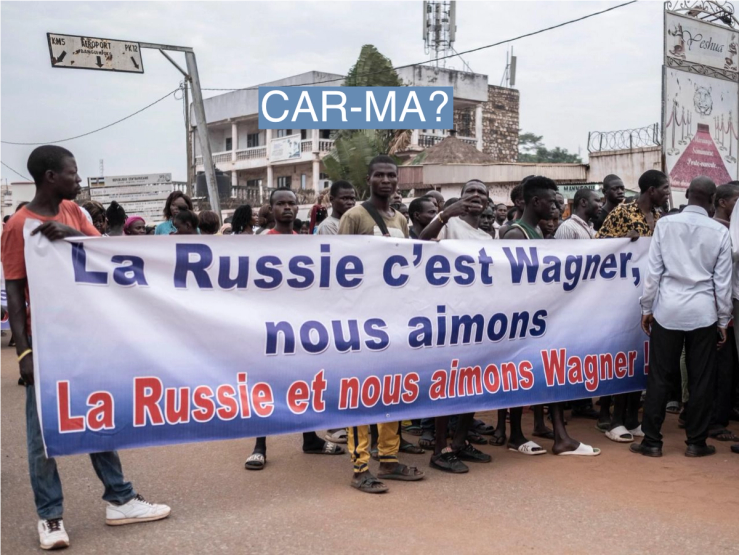The News
The Wagner private military group’s abortive mutiny in Russia risks destabilizing African countries where its troops have been deployed.
A number of African nations, including Mali, the Central African Republic (CAR), Libya and Sudan, rely on Wagner to fight insurgents, quell dissent, train local troops, and spread propaganda.
President Vladimir Putin, in a televised address on Monday, declared that Wagner’s leader, Yevgeny Prigozhin, will “be brought to justice” after the latter ordered his troops to march to Moscow on Saturday before later calling them off. Putin said Wagner fighters could sign a contract with the Russian military, return to their families or move to Belarus.
“Wagner is not Russia anymore,” said Rama Yade, senior director of the Atlantic Council’s Africa Center, referring to the view widely held prior to the mutiny that the military force was inextricably linked to the Kremlin.
Know More
Wagner, founded in 2014, routinely operates in African countries for access to natural resources such as gold and precious stones. Analysts say this has become a crucial part of its business model and trading commodities has helped Russia to evade sanctions imposed over the Ukraine war.
CAR President Faustin-Archange Touadéra has used Wagner to fight insurgencies since 2018. Mali’s military junta, whose leaders seized power in 2021, have also called on Wagner to fight Islamist rebels.
Wagner has been accused of carrying out human rights abuses in the CAR and Mali. Calls by the United Nations earlier this year for an independent investigation into possible crimes by Malian troops and Wagner fighters in March 2022 soured the UN’s relationship with Bamako’s ruling junta. Earlier this month Mali called on the UN to withdraw its 13,000-strong peacekeeping force, Minusma, from the West African country “without delay.”
Alexis’s view
Mali and the CAR are now in limbo. Wagner’s structure must change because Putin can’t allow a private force capable of mounting a rebellion to remain in its current form. The move to absorb Wagner fighters into the Russian army is the first stage of that transformation. Mali and CAR rely so heavily on Russian fighters that they will be seriously weakened if troops are redeployed in large numbers as part of that restructuring, which could also destabilize neighboring countries.
Mali’s military rulers formed a close alliance with Russia while growing more hostile to other foreign nations, who reacted by withdrawing peacekeeping troops. Minusma’s seemingly imminent exit will leave around 1,000 Wagner troops to fight militants linked to Islamic State and al Qaeda who have killed thousands of people in the last decade and control huge swathes of central and northern Mali. The use of aircraft, procured from Russia, also helped Mali’s rulers. But events in Russia call into question the extent of the support the junta will receive.
Wagner clearly no longer has the Kremlin’s backing and African leaders who lean on them must wait for power struggles in Russia to play out. They must also realize that Putin will prioritize stabilizing the situation at home and pursuing victory in Ukraine in the midst of Kyiv’s counteroffensive.
The implications could be dire for Mali, CAR and countries around them. Both nations are fragile and at risk of falling deeper into disorder that could spill over across borders. We’ve already seen those problems unfold in the Sahel — where Islamist militants have attacked Burkina Faso, Chad and Niger in recent years. And CAR borders Sudan which is mired in a conflict that has spawned a growing humanitarian crisis.
Russia has used Wagner to expand its economic and political footprint in Africa. It’s been particularly effective as a propaganda tool that portrays Moscow as a trustworthy ally and demonizes France in its former colonies. Lagos-based risk analyst Cheta Nwanze, who monitors the Sahel, told me Wagner’s use as a geopolitical weapon that generates funds from African natural resources meant Moscow would find a way to maintain its presence on the continent.
“Russia needs to have a private military company to do its dirty work, so someone else will be found to take over what Prigozhin leaves behind,” said Nwanze, lead partner at SBM Intelligence. “It may even be called another name… but the need still exists.”
The uncertainty probably means there may be a “brief respite” from the expansion of Wagner operations across the subregion, said Peter Pham, the former U.S. special envoy for Africa’s Great Lakes Region. “But nature abhors a vacuum and, inexorably, someone else will fill the void if security and proper governance do not.”
Room for Disagreement
Russian Foreign Minister Sergei Lavrov on Monday said Wagner members were working as “instructors” in Mali and CAR. “This work, of course, will continue,” he said in an interview with Russian state news channel RT, adding that the aborted revolt would not affect Russia’s ties with “partners and friends.”
The View From Bamako
“In terms of Wagner’s expansion in Africa, they have been eying Burkina Faso for a while to sell weapons and mercenaries,” said Ulf Laessing, who heads the Sahel program at the Konrad Adenauer Foundation, a German think-tank. “Rulers there and elsewhere in the Sahel will think twice about making a bet on Russia, like Mali and CAR have done, given the uncertainties around Wagner’s future.”
Notable
- Wagner’s presence in the Central African Republic was documented in a series of Financial Times articles by Neil Munshi in which he reported on alleged human rights abuses and an action movie glorifying a Russian military force that premiered in Bangui and acted as a propaganda tool in the country.

